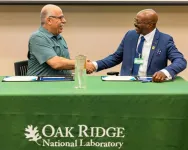(Press-News.org) A study has revealed significant therapeutic inertia in the treatment of women with multiple sclerosis (MS), highlighting gender disparities that could impact long-term health outcomes for women of childbearing age.1
The findings, presented today at ECTRIMS 2024, suggest that concerns related to pregnancy may lead to delayed or reduced use of disease-modifying treatments (DMTs), even before pregnancy becomes a consideration.
In an extensive analysis of 22,657 patients with relapsing MS (74.2% women) who were on the French MS registry (OFSEP), researchers found that over a median follow-up of 11.6 years women had a significantly lower probability of being treated with any DMT (OR=0.92 [95% CI 0.87-0.97]) and were even less likely to be prescribed high-efficacy DMTs (HEDMTs) (OR=0.80 [95% CI 0.74-0.86]).
The difference in DMT usage varied across different treatments and over time. Teriflunomide, fingolimod, and anti-CD20 therapies were significantly underused throughout their entire availability, (OR 0.87 [95% CI 0.77-0.98], OR 0.78 [95% CI 0.70-0.86], and OR 0.80 [95% CI 0.72-0.80, respectively]. Interferon and natalizumab were initially used less frequently, but their usage equalised over time (OR 0.99 [95% CI 0.92-1.06], OR 0.96 [95% CI 0.86-1.06], respectively). In contrast, glatiramer acetate and dimethyl fumarate were initially used equally between genders, but eventually became more commonly prescribed to women (ORs 1.27 [95% CI 1.13-1.43], OR 1.17 [95% CI 1.03-1.42], respectively).
The study further highlighted that the disparity in treatment emerged after two years of disease duration for DMTs and as early as one year for HEDMTs. Interestingly, this gender-based treatment gap did not significantly vary with patient age, indicating that therapeutic inertia may persist regardless of the woman’s stage in life.
"These findings underscore the critical need to reassess how we make treatment decisions for women with MS, particularly those of childbearing age,” says Professor Sandra Vukusic, lead author of the study. “Women may not be receiving the most effective therapies at the optimal time, often due to concerns about pregnancy risks that may never materialise. The use of DMTs and HEDMTs is frequently limited by potential and unknown risks associated with pregnancy, as there is often insufficient data available when these drugs first come to market.”
Both neurologists and patients contribute to this therapeutic inertia, many taking a precautionary approach and avoiding these treatments. “Neurologists might be hesitant to prescribe DMTs, particularly if they are not comfortable with managing pregnancy-related issues,” explains Professor Vukusic, “At the same time, women, understandably, do not want to take any risks for their child or pregnancy, their primary concerns being congenital malformations, fetal loss, and fetal growth disorders. Women will also experience discomfort if their neurologist seems uncertain.”
Moving forward, the research team plans to delve deeper into the factors contributing to this therapeutic inertia, with a focus on improving treatment strategies that prioritise both the long-term health of women with MS and their reproductive goals.
“The main impact of this inertia is the less effective control of disease activity during DMT-free periods, leading to the accumulation of lesions and an increased risk of long-term disability,” emphasises Professor Vukusic. “This represents a real loss of opportunity for women, especially in an era where DMTs are so effective when used early.”
To address these challenges, the team recommends a multi-faceted approach: “Empowering patients through education, improving the dissemination of recent findings, providing formal training for specialists, and actively collecting and analysing real-world data are essential steps to reducing therapeutic inertia and ensuring equity in treatment,” Professor Vukusic concludes.
ENDS
Notes to Editors
A reference to ECTRIMS 2024 must be included in all coverage and/or articles associated with this study.
For more information or to arrange an expert interview, please contact the ECTRIMS Press Office at: press.ectrims@congrex.com
About the study author:
Sandra Vukusic is Professor of Neurology and head of the Multiple Sclerosis clinic (Neurology dept. A) at the Lyon University Hospital, France.
About the European Committee for Treatment and Research in Multiple Sclerosis (ECTRIMS):
ECTRIMS is a non-profit organisation and an independent representative European-wide organisation devoted to MS. It serves as Europe’s and the world’s largest professional organisation dedicated to the understanding and treatment of MS.
The 40th ECTRIMS Congress takes place between 18-20 September 2024 in Copenhagen, Denmark.
Website: https://ectrims.eu/
References
Is there therapeutic inertia in women with MS? Vukusic, S., et al. (2024). Presented at ECTRIMS 2024. END
With publicly funded correlative science in the nation’s Cancer Cooperative Groups reduced to a trickle, Group leaders propose implementing a long-standing National Academy of Medicine recommendation to bring new money to this area of research through public-private partnerships. They also recommend major process changes to remove significant barriers for researchers to access the biological samples contributed by patients. The current Journal of Clinical Oncology issue features ‘Correlative Science in the Cooperative Group System—Re-Engineering for Success.’
This Position Paper represents consensus among Evanthia Galanis, MD, DSc for the Alliance for Clinical ...
Kashif Nawaz, distinguished researcher and section head for Building Technologies Research at the Department of Energy’s Oak Ridge National Laboratory, has been named a Fellow of the American Society of Mechanical Engineers, or ASME. The Fellow grade recognizes outstanding engineering achievements for members with 10 or more years of active practice.
Nawaz joined ORNL in 2016 as a research scientist in buildings equipment. He specializes in the heating, cooling and dehumidification systems of buildings including the development of novel heat exchangers and enhanced phase-change material ...
U2opia Technology has licensed Situ and Heartbeat, a package of technologies from the Department of Energy’s Oak Ridge National Laboratory that offers a new method for advanced cybersecurity monitoring in real time. Situ, which discovers and understands otherwise-undetectable events by analyzing security data, will go to the market through a commercial license. The company will continue to explore opportunities for Heartbeat, which detects cyber attacks by focusing on the physical behavior of a protected device, through a research and development license.
U2opia Technology, a woman- and minority- led company, is directed by Maurice Singleton III, chief executive officer, ...
Some of the most dramatic climatic events in our planet’s history are “Snowball Earth” events that happened hundreds of millions of years ago, when almost the entire planet was encased in ice up to 0.6 miles (1 kilometer) thick.
These “Snowball Earth” events have happened only a handful of times and do not occur on regular cycles. Each lasts for millions of years or tens of millions of years and is followed by dramatic warming, but the details of these transitions are poorly ...
Wednesday, September 18, 2024, CLEVELAND: A clinical trial has demonstrated that the cancer drug pomalidomide is safe and effective in treating hereditary hemorrhagic telangiectasia (HHT), a rare bleeding disorder that impacts more than 1 in 5,000 people worldwide. The trial, led by Keith McCrae, M.D., of Cleveland Clinic and supported by the National Institutes of Health, was stopped early because of these successful findings, and has been published in the New England Journal of Medicine.
The impetus for this trial was a single patient. About ...
A clinical trial supported by the National Institutes of Health (NIH) was stopped early after researchers found sufficient evidence that a drug used to treat bone marrow cancer and Kaposi sarcoma is safe and effective in treating hereditary hemorrhagic telangiectasia (HHT), a rare bleeding disorder that affects 1 in 5,000 people worldwide. The trial results, which are published in the New England Journal of Medicine, detail how patients with HHT given the drug, called pomalidomide, experienced a significant reduction in the severity of nosebleeds, needed fewer of the blood transfusions and iron infusions that HHT often demands, ...
A drug approved for treating the blood cancer multiple myeloma may offer a safe and effective way to reduce the risk of severe nosebleeds from a rare but devastating bleeding disorder. Hereditary hemorrhagic telangiectasia (HHT), the world's second-most-common inherited bleeding disorder, affects approximately 1-in-5,000 people and can have life-threatening complications, but there are currently no U.S. FDA-approved drugs to treat HHT. The PATH-HHT study, the first-ever randomized, placebo-controlled ...
Associate professor of chemical engineering Bryan Berger received funding from the Environmental Protection Agency to reduce the impact of per- and polyfluoroalkyl substances, known as PFAS, in food and farming communities.
The award is part of the over $15 million the EPA granted to 10 institutions for PFAS reduction research, aimed at improving farm viability and increasing knowledge of PFAS accumulation.
Water sample collection for testing in Limestone, Maine. (Contributed photo)
Known as forever chemicals, PFAS are man-made substances that have been used in industry ...
Superintelligence — AI systems that surpass human intelligence — could be just a decade away, raising urgent questions about how to ensure their safety and alignment with human values, according to OpenAI.
These AI systems could be hugely beneficial, but more sophisticated systems create the possibility for unpredictability. Misinterpreting human values or intent, algorithmic biases and security risks are all cause for concern, especially with highly developed AI systems where the potential consequences are far greater.
Yu Meng, assistant professor of computer science at ...
WASHINGTON, D.C.—A new website, AnimalMethodsBias.org, created by the Coalition to Illuminate and Address Animal Methods Bias (COLAAB), provides researchers guidance and resources aimed at helping them successfully publish nonanimal biomedical research by overcoming the preference some peer reviewers have for animal-based research methods.
“We recently found that half of researchers surveyed had been asked by reviewers to add an animal experiment to their otherwise animal-free study,” says Catharine ...





